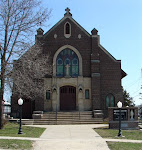Friday, February 4, 2011
What is in a Name?
Fr. Pisut,
What is in a Name?Why is the the Catholic faith called Roman Catholicism? Thanks!
Sam
Sam,
What is in a name? We become so accustomed to the names of groups and individuals around us that we often use their names without thinking much of their meanings or origins. Such is the case with the title Roman Catholicism. So let us examine the meaning and origin of the title. While all Catholics are Christian (though, sadly, there are those who would erroneously dispute this) not all Christians are Catholic. In the same way all Roman Catholics are Catholics but not all Catholics are Roman Catholics. The term Catholic comes from the Greek word katholikos and means general or universal. It was first used in reference to the corporate body of Christians under the leadership of the bishop. In the first century St. Ignatius of Antioch (37-107) writes in his letter to the Smyrnaeans, "Wheresoever the bishop shall appear, there let the people be, even as where Jesus is, there is the Catholic Church" (Smyr. 8:20).
With the exceptions of a few bodies of Christians in North Africa and the Middle East the term Catholic referred to the Church as a whole, the entirety of Christendom, until the split with Eastern Christianity, the Orthodox Church, in 1054. The Catholic Church, however, which includes bodies of Christians who may reside in the traditional geographical realm of the Orthodox world, is made up of many different rites. The term rite refers to specific religious custom, usage or ceremony as well as theological traditions that express the Catholic faith and participates in its fullness within the realm of a legitimate diversity. These rites have their origin in geographical and cultural influences. In the Catholic Church there are nine rites: Latin or Roman, Byzantine, Armenian, Chaldean, Coptic, Ethiopian, Malabar, Maronite and Syrian. All these rites can trace their historical origins to the Apostolic succession of bishops who are connected to the Apostles by the laying on of hands (ordination) and the transmission of the Apostolic Faith. The largest of these is the Latin Rite which has its origins in the city of Rome in the first century. Because Catholics believe that Christ founded his Church upon St. Peter, who ultimately lived and died in Rome, the Latin Rite or Roman Catholic Church has come to shape and define Catholicism in the West. However, members of the other rites mentioned are fully Catholic as well.
Fr. Pisut




